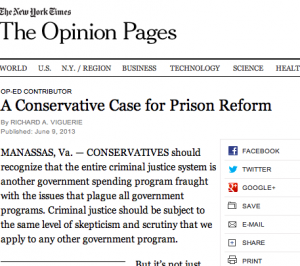June 11, 2013
 Richard A. Viguerie, a leading conservative figure, argues for Prison Reform, in an OP ED piece in the New York Times (click on image on the left for article). He argues that “Conservatives known for being tough on crime should now be equally tough on failed, too-expensive criminal programs. They should demand more cost-effective approaches that enhance public safety and the well-being of all Americans”.
Richard A. Viguerie, a leading conservative figure, argues for Prison Reform, in an OP ED piece in the New York Times (click on image on the left for article). He argues that “Conservatives known for being tough on crime should now be equally tough on failed, too-expensive criminal programs. They should demand more cost-effective approaches that enhance public safety and the well-being of all Americans”.
While it’s wonderful that the conservative movement appears to support Prison and Sentencing Reform, the law enforcement community and its conservative allies provided key support for alternatives to prison (read: Drug Court) as early as the mid 90’s.
I had the opportunity to observe this phenomenum up close. While I found limited local law enforcement and conservative support for Drug Court in the early 1990’s, the environment began to change by 1994. When I returned to D.C., as the President of the newly formed National Association of Drug Court Professionals (NADCP), the political climate had changed, but not necessarily for the better.
The Republican party had taken over the Congress in 1994, and it wasn’t clear that funding for drug courts written into the budget by the Clinton administration would survive. It would take support for drug courts from key republican committee chairs and members, to fund the nascent drug courts. This could be described as a critical point in the drug court movement’s development, when this new innovation could have easily faltered without adequate funding.
I saw my job, as NADCP’s President, to encourage and provide support to drug court judges, D.A.s and others who were willing to visit their Congressional members, both in D.C. and at home. It was their job to convince those Congressional leaders that drug courts worked and deserved federal funding. I contacted Drug Court judges from key states with Republican Chairs or influential congressmen, I encouraged drug court judges to visit D.C.and meet with congressional members, and I made sure that visiting judges had talking points and other information to rely on in private conversations. I had no idea how successful a strategy that was to be.
It turned out that the judges (especially) liked to work the halls of congress and were more than willing to move to the fore in supporting drug court funding and visiting with their members of Congress. Many a judge went to school or belonged to the same social circle or clubs as our state and congressional leaders. Drug Court Judges invited their congressmen and local political leaders to visit their drug court (preferably at a graduation, when they would be given the opportunity to speak at the ceremony, before the media). Many of the important Committee Chairs had drug courts and drug court judges from their jurisdictions advocating for drug court funding. And it didn’t matter much whether they were democrat or republican, liberal or conservative.
While many a new program died that political season, drug courts received there first ever federal funding from a Republican controlled Congress.

